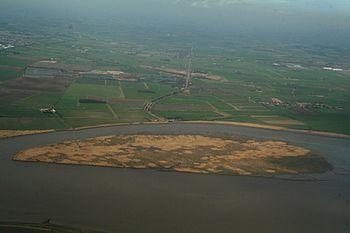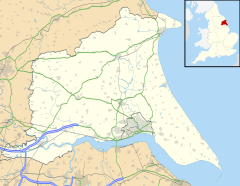Whitton Island facts for kids

Aerial view of Whitton Island
|
|
| Geography | |
|---|---|
| Area | 1.2 km2 (0.46 sq mi) |
| Administration | |
|
England
|
|
| County | |
| Civil Parishes | Broomfleet, Blacktoft, Alkborough, Whitton |
| Demographics | |
| Population | 0 (2014) |
| Whitton Island | |
|---|---|
| OS grid reference | SE878250 |
| Shire county | |
| Region | |
| Country | England |
| Sovereign state | United Kingdom |
| Police | Humberside |
| Fire | Humberside |
| Ambulance | Yorkshire |
| EU Parliament | Yorkshire and the Humber |
Whitton Island is a special island located at the western end of the Humber Estuary in northern England. It's shaped a bit like an almond!
Contents
Where is Whitton Island Located?
This unique island sits right on the border between two counties. To the north, you'll find the East Riding of Yorkshire. To the south, it's North Lincolnshire. The county line usually runs through the middle of the water.
Parishes on the Island
Whitton Island is divided among four local areas called civil parishes. Even though it's named after the parish of Whitton, most of the island is actually in Blacktoft in Yorkshire. A big part is also in the nearby parish of Broomfleet. Smaller sections on the southeast side are in Alkborough and Whitton in Lincolnshire.
How Whitton Island Was Formed
Whitton Island is a type of island called an ait (pronounced "eight"). Aits are formed when sand and gravel carried by a river slowly build up over time. Plants then start to grow on these piles of material, which helps to hold them together.
From Sandbank to Island
For a long time, this area was just a mud and sand bank known as Whitton Sand. It was part of the Humber Wildfowl Refuge, a protected area for birds. Only recently has enough material built up for it to become a proper island. This means it's now shown on maps as a new land feature!
Whitton Island as a Nature Reserve
The island is owned by a company called Associated British Ports. In 2014, they started talking with the RSPB, a charity that protects birds.
Protecting Wildlife on the Island
In March 2017, the RSPB signed a 50-year agreement to manage Whitton Island. They turned the island, which was about 120 hectares (the size of 300 football fields!), into a nature reserve. To make it a better home for wetland birds, the RSPB dug a large lagoon and several smaller ponds.
Birds That Call Whitton Island Home
Thanks to these improvements, many more birds have come to the island. Some of these birds had not been seen so far up the estuary before! Whitton Island now offers a safe place for birds to nest and find food.
You might spot birds like:
- Avocets, which are known for their long, upturned beaks.
- Pink-footed geese
- Teal
- Wigeon
- Dunlin
- Spoonbills
- Curlew
- Turnstone
- Ringed plover
The island is a vital spot for these birds to rest, feed, and raise their young.


